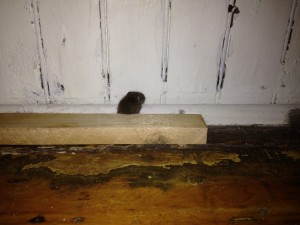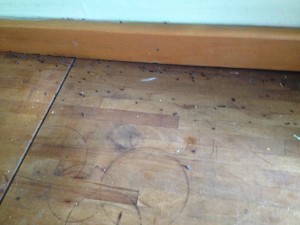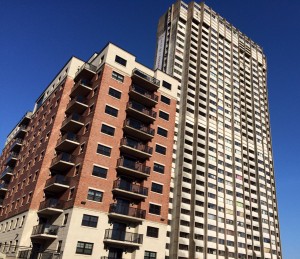
A mouse or two never used to bother her, but within a few months she was overrun by them, they took over her walls and set up a colony in her kitchen turning her oven into a lavatory rendering it unusable.
When she moved closer to Halifax’s North End Claire Zimmerman thought she was done with the shady student living conditions of the South End– entering into her last year of school she headed for the greener pastures of a charming apartment in a historic home. Like many students she found herself in an unwinnable battle with a wealthy landlord to provide decent living conditions.
Every spring thousands of students leave behind on-campus dorms in search of rental homes for the next year, no longer protected by the social contract and reputation of their post-secondary schools and now finding themselves dealing with a growing number of profit hungry landlords that know every loophole in a broken system. The landlords know the students lack the time, know-how and resources to stand up for themselves and have the advantage of a highly competitive rental market.
Claire’s living conditions didn’t improve when one day she came home from class at King’s College to find bedbugs in her furniture. Like with the mice, she says the landlord put the blame of her. Claire and her boyfriend were made responsible for replacing their possessions that were destroyed by the infestations.
Health and Wellness Nova Scotia provides resources for bedbug infested residents, but they do not track the infestations because the bugs a seen as pests and do not spread disease.
Linda Passerini, a senior health consultant with Health and Wellness Nova Scotia says her office receives a number of calls about bedbugs, but there’s little she can do other than to refer them to the resources.
She says houses with clutter and less than frequent cleaning practices increase the chances of bedbugs and that can be more common with student living situations.
Meanwhile the landlord blamed Claire’s cat for the mice and bedbugs told her to get rid of it for a few weeks while she poisoned the mice. When Claire declined, she was eventually asked to leave the lease, prematurely ending her tenancy. By that point she was relieved to be free of the pests and moved on with her life.
By the end of her tenancy, Claire had to deal with a number of issues including leaks, mice, bedbugs, broken appliances, lack of heating and decaying walls.

She thought of seeking recourse through the Nova Scotia Tenancy Board, but figured it was an unwinnable battle, as her landlord is a high-powered Halifax lawyer and Claire thought she wouldn’t stand a chance. Out of fear she did not want to name the landlord or the exact location of the home.
“I feel it’s a very Halifax thing, we (tenants) see it as our fault and because we’re students we feel powerless,” Claire says.
She’s not alone, in researching this story dozens of students shared horrific tales of their battle landlords over erroneous illegal fees, infestations, broken promises and substandard living conditions and a system that is failing those it seeks to protect.
Another student, Rowenna Gerlach entering her fourth year at Dal had a similar story.
Last year she and a group of friends rented an apartment on Barrington Street in a small complex. It is a historic property, but the warmth of the charm didn’t last when temperatures fell last winter. Because heating costs were included in the rent, they did not have control over the thermostat. despite endless pleas with the landlord, the group of girls were forced to wear jackets indoors in order to be comfortable in the apartment. The landlord continued to control the heat and as a result it was between 16 and 19 degrees celsius most the winter.
When a parent of one of the tenants got involved on her daughter’s behalf, she was subjected to an endless game of phone and email tag and nothing was ever done about the problem.
One night Rowenna was awoken by chunks of falling plaster from the ceiling covering a number of her possessions in the white chalky substance, once again replacement costs and blame was placed on her.
Rowenna and her roommates, like Claire considered taking the matter to the tenancy board, but lacked the time and know-how to do so.
Rowenna says she paid a deposit to the landlord in cash and the money is yet to be returned to her. She was not aware that according to the law a landlord can only demand a deposit if it is placed in a joint account with the tenant.
With vacancy rates across the province, city and the South End rising annually, landlords may be feeling the heat. The vacancy rate for three or more bedroom units in the South End has more than doubled since 2010 according CMHC statistics–students commonly live in such units
“I felt ignored and misled,” she adds “I feel because we were young they took advantage of us.”

When she moved out, once again she scrambled to find a new place. When she hastily signed for a room in the notorious Fenwick Towers, only to show up on move in day with the apartment still inhabited by the previous tenants.
“We had to wait six hours in the parking lot with all of our things as they moved the people out,” she says.
The lease dictates that the flat would be “Professionally cleaned” before move in, but that promise was never kept.

Although students may feel overwhelmed and helpless there are some resources to help them.
Dal offers free legal aid services to students and a number of online resources.
Fiona Traynor is a community legal worker at Dal’s legal aid services, she says the office gets a constant flow tenant-landlord disputes and requests for help navigating through the ever-changing laws.
She says a growing problem is the number of landlords trying to collect various types of deposits and fees illegally.
She also says they can help with damage caused by bedbugs and mice if a landlord isn’t doing their part.
She urges student tenants to keep a paper trail, take pictures of damages and most importantly to read the act and the lease before making their decision.
For the most part it’s a losing battle as many students don’t do their homework before moving in and are overwhelmed as problems arise. As a result she says it’s mostly a reactive approach by students who come to the office after a problem has existed for a while.
She thinks something as minor as an inspection done with the landlord before moving in can be vital in proving negligence down the road.
“Read the act and ask a lot of questions before moving in.”
Another option is for students to get tenant’s insurance, but it isn’t easy.
Keith an insurance broker, who did not want to be identified says that a growing number of landlords are requesting that tenants have policies.
He recommends it for two reasons: to protect the tenants’ belongings and legal protection against liability.
He says students could be more likely to face liability claims. For instance a student learning to cook or operate an appliance for the first time could cause a fire or significant damages to property and insurance covers that.
He says it’s not as simple as it seems, many insurance companies will not ensure students because oftentimes there are three or more unrelated people living together in the same dwelling. He says alternative providers and custom policies might be the only options and they can be very costly as typical student dwellings are graded as a higher risks than simple family homes.

Last year rent went up 1.4 per-cent in the South End, according to Guillaume Neault, a CMHC analyst, students of Halifax have a few things working against them.
He says the location of the schools happens to overlap competitive rental areas, rent rates are already high and are rising each year.
He says the age of the buildings can also lead to premium rates as a number of students live in historic properties.
According to his research 33 per-cent of South End dwellers spend 30 per-cent or more of their income on rent.
Note: Attempts were made to speak with the various landlords, but none have responded.
